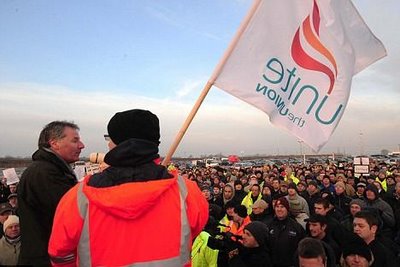The Lindsey refinery protests and the political implications.
 The general disarray over the Lindsey protests and the wildcat strikes in solidarity on the wider left is indicative of the general malaise which has fallen upon those who should, in a recession caused by allowing capitalism to run completely rampant, be reaping the benefits. Here is a cause which is clear - supporting workers who want to work, the same workers so often slandered as lazy and more content with sponging on benefits, but who are being denied jobs because of the absurd vagaries of outsourcing across continents, combined with corporations taking advantage of rulings at the European Court of Justice.
The general disarray over the Lindsey protests and the wildcat strikes in solidarity on the wider left is indicative of the general malaise which has fallen upon those who should, in a recession caused by allowing capitalism to run completely rampant, be reaping the benefits. Here is a cause which is clear - supporting workers who want to work, the same workers so often slandered as lazy and more content with sponging on benefits, but who are being denied jobs because of the absurd vagaries of outsourcing across continents, combined with corporations taking advantage of rulings at the European Court of Justice.There was certainly initial cause for concern, it must be admitted. The appropriation of the xenophobic "British jobs for British workers" slogan, stolen by Gordon Brown from the far-right, itself illegal under European law, suggested that these protests might not have been to demand jobs but instead the first public rumblings of discontent over New Labour's open door immigration policy's effect on the ordinary British worker. There were indications that the protests, rather than being union organised, were the first signs that the British National Party was effectively starting to make headway amongst those more likely to be union members than members of the far-right. These, thankfully, seem to have been misplaced: the BNP were sent packing from Lindsey yesterday, despite their lies about being welcomed, and another site has quickly been exposed as a BNP front. Even more encouragingly, another site which seems to be directly linked to the protesters, bearfacts.co.uk, seems to be far more representative of the protesters' position: militant, and unrelentingly left-wing, with clear demands.
The socialist left, always divided, has been getting its ideological knickers in a twist. The Socialist Workers' Party, always wanting an idealised working class rather than the one we have in reality, quickly denounced the apparent nationalist sentiment and appealed for international working class solidarity. While there is something in this argument, considering the movement of construction workers across borders, this ignores the key facts in this dispute: that the workers in Lindsey were depending and expecting that these jobs would be available to them, when Total's outsourcing meant they didn't even get a look in. This was what sparked the protests, not that foreign workers were being employed in a fair process. The Socialist Party seems to be the only political grouping with representation on the unofficial strike committee, and unsurprisingly are fully behind the action, stressing that this is aimed at company bosses, not at foreign workers themselves.
At the other extreme, the response by the Labour party has been completely dreadful. Whether because Brown has been spooked by his ridiculous, ill-thought out slogan coming back to haunt him, or because organised labour is something which the Labour party had hoped it had cowed, his idiotic statement that the strikes were "not defensible", before going on to claim that he had meant something completely different from the words that had emanated from his mouth at the party conference in 2007 showed just how bankrupt his thinking on the recession has become. His pledges of retraining are too little too late and completely miss the point when there are jobs here that no one needs to retrain for but which they have no chance of filling. That Mandelson, the architect and espouser of completely relentless free trade with no regards whatsoever for the consequences for ordinary workers barely disguised his contempt while dismissing the protests on the grounds that there must "no return to protectionism", as if workers protesting for jobs were demanding isolation and self-sufficency, was no surprise.
Labour's woeful attitude can only be contrasted with the Conservatives' apparent rediscovery of moral or ethical capitalism. While this will always be a contradiction in terms, David Cameron's positioning of his party as being more likely to tame economic policy than Labour is welcome, however shallow the actual substance is behind it. We should be under no illusions that many Conservative policies, such as on welfare, inheritance tax and the "broken society" are inherently reactionary, but we really are starting to edge towards the time where it becomes impossible to be even slightly content with the status quo any longer. Their immediate response at the time of Brown's "British jobs for British workers" remark was to challenge it and show it up as both xenophobic, unworkable and unimplementable, and while they too denounce the strikes, they have been far more receptive than their supposed left-wing opponents have been.
Derek Simpson's proposals for resolving the protests and the solidarity strikes are a good start, but they are only that. While the unions cannot because of the anti-trade union legislation take formally part in the secondary action, they could be doing so much more to put pressure on Labour to challenge the European Court of Justice rulings at the very least. As Lenin points out, Labour's stance from the very beginning has been to provide opt-outs from European legislation which protects workers on the continent but which leaves those here as some of the most vulnerable and easy to be sacked, all to the delight of the CBI and the right-wing press. Whether it's the 48-hour working week or the chapter of fundamental rights, our politicians have long kept rights from British workers which others can take for granted. Polly Toynbee is also right to point out that unions, contrary to the myth and the way any strikes are now covered, are becoming ever weaker, with fewer strikes than ever before.
One of the main fears was that the recession would cause an already cruel country to become even harsher, more selfish and introverted, individuals left blaming each other or the entirely wrong people for their hardship. Instead, as the strikes have shown, despite initial misinterpretations, working class solidarity is still alive and well and capable of causing great political discomfort. The challenge now is to turn this solidarity into a campaign movement which fights for all workers, regardless of nationality, to be given a fair chance of employment and extended rights across the board. That will be much more difficult even than turning up at 5:30am outside a refinery in driving snow.
Labels: British jobs for British workers, class struggle, Gordon Brown, immigration, Lindsey protests, migrant workers, politics, socialist left


